

Coffee. Coffee is a brewed beverage prepared from the roasted or baked seeds of several species of an evergreen shrub of the genus Coffea.

The two most common sources of coffee beans are the highly regarded Coffea arabica, and the "robusta" form of the hardier Coffea canephora. The latter is resistant to the coffee leaf rust (Hemileia vastatrix), but has a more bitter taste. Coffee plants are cultivated in more than 70 countries, primarily in equatorial Latin America, Southeast Asia, and Africa. Once ripe, coffee "berries" are picked, processed and dried to yield the seeds inside. The seeds are then roasted to varying degrees, depending on the desired flavor, before being ground and brewed to create coffee. Coffee is slightly acidic (pH 5.0–5.1[1]) and can have a stimulating effect on humans because of its caffeine content. Etymology[edit] The first reference to coffee in the English language is in the form chaoua, dated to 1598.
History[edit] Legendary accounts[edit] Historical transmission[edit] Starbucks Signature Drink Builder. Alltop - Top Coffee News. Habitual coffee consumption and risk of hypertension: a systematic review and meta-analysis of prospective observational studies. Critic. A critic is a professional who communicates their opinions and assessments of various forms of creative work such as art, literature, music, cinema, theater, fashion, architecture and food.

Critical judgments, whether derived from critical thinking or not, may be positive, negative, or balanced, weighing a combination of factors both for and against. Formally, the word is applied to persons who are publicly accepted and, to a significant degree, followed because of the quality of their assessments or their reputation. Unlike other individuals who may editorialize on subjects via web sites or letters written to publications, professional critics are paid to produce their opinions for print, radio, magazine, television, or Internet companies. Coffee Health Risks. Despite 20 years of reassuring research, many people still avoid caffeinated coffee because they worry about its health effects.
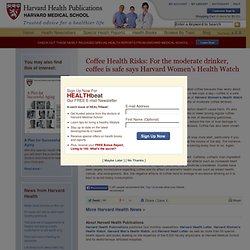
However, current research reveals that in moderation—a few cups a day—coffee is a safe beverage that may even offer some health benefits. The September issue of Harvard Women's Health Watch weighs the pros and cons of this popular beverage and eases the concerns of moderate coffee drinkers. The latest research has not only confirmed that moderate coffee consumption doesn't cause harm, it's also uncovered possible benefits. Studies show that the risk for type 2 diabetes is lower among regular coffee drinkers than among those who don't drink it. Brian Hutchinson: The overcaffeination generation. Another large-chain coffee shop is under construction on West Hastings, one of Vancouver’s most handsome high streets.
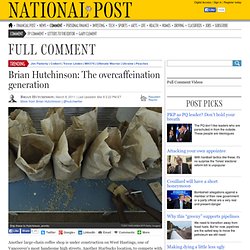
Another Starbucks location, to compete with four home-grown cafes already doing business within four city blocks. From a business perspective, this seems like madness. But the local coffee market is apparently insatiable, so who knows; perhaps they will all thrive. It does seem, however, that the urban landscape could benefit from something other than more coffeehouses. The same can be said for most Canadian cities; they suffer from a boring retail culture. There’s a greater problem, one we seem averse to acknowledge. Alarm bells rang for me last year when my middle-aged heart started beating irregularly. My symptoms disappeared almost as soon as I quit. Coffee: An Eye-Opening Overview of the Health Benefits and Risks of Coffee According to Recent Resea. By www.SixWise.com Coffee is one of few beverages that has endured through the ages and made its way into many Americans' morning (and sometimes afternoon and evening) routines.
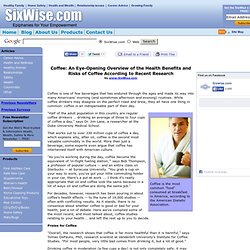
While coffee drinkers may disagree on the perfect roast and brew, they all have one thing in common: coffee is an indispensable part of their day. "Half of the adult population in this country are regular coffee drinkers … drinking an average of three to four cups of coffee a day," says Dr. Jim Lane, a researcher at the Duke University Medical School. Possible health risks of coffee. Coffee Association of Canada. Welcome to Canada's original coffee website. Health effects of coffee. Brewed beverage made from the seed of Coffea species Coffee is a brewed drink prepared from roasted coffee beans, the seeds of berries from certain Coffea species.
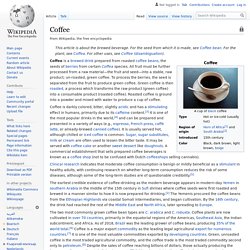
All fruit must be further processed from a raw material—the fruit and seed—into a stable, raw product; un-roasted, green coffee. To process the berries, the seed is separated from the fruit to produce green coffee. Coffee drinking linked to reduced stroke risk in women. Drinking more than a cup of coffee a day was associated with a 22 percent to 25 percent lower risk of stroke, compared with those who drank less, in a study reported in Stroke: Journal of the American Heart Association.
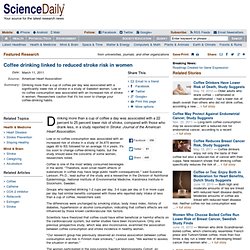
Low or no coffee consumption was associated with an increased risk of stroke in a study of 34,670 women (ages 49 to 83) followed for an average 10.4 years. It's too soon to change coffee-drinking habits, but the study should ease the concerns of some women, researchers noted. Coffee is one of the most widely consumed beverages in the world. Coffee drinking linked to reduced stroke risk in women. Coffee Consumption and Risk of Stroke in Women. Coffee.